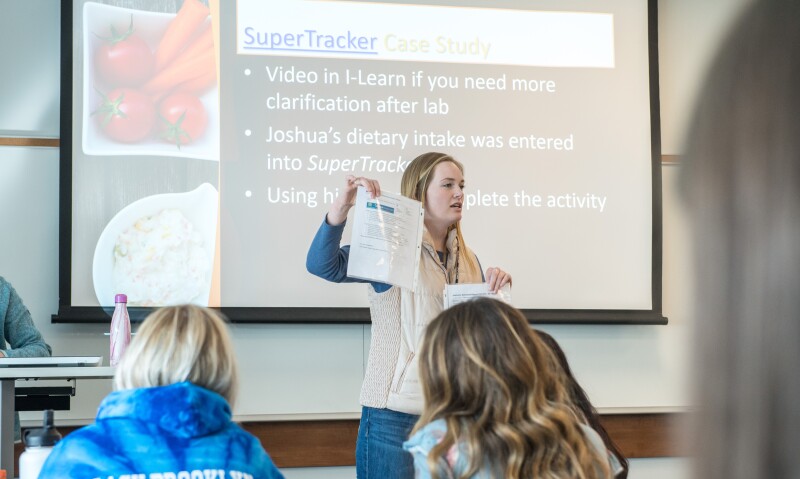
Interested in nutrition and dietetics and think you might want to become a registered dietitian nutritionist (RDN)? Although BYU-Idaho does not offer a dietetics program, there are possible routes you may take in becoming a registered dietitian nutritionist.
First, you should understand what a dietician is and does. Then you can see how to become a RDN.
Registered Dietitian Nutritionist Overview

A RDN is a highly trained health professional that is recognized as an expert on food and nutrition. RDNs work in a variety of settings:
- Medical healthcare facilities
- Community & public health agencies
- Schools & universities
- Research facilities
- Health & nutrition businesses
- Outpatient & private consultation clinics
Pathways to Becoming a Registered Dietitian Nutritionist
There are two main routes or pathways to become a registered dietitian nutritionist:
- undergraduate didactic program and internship, or
- coordinated undergraduate or graduate program in dietetics.
After completion of one of these pathways, students are then qualified to take the Registered Dietitian Nutritionist Exam and officially become a registered dietitian nutritionist. As noted above, BYU-Idaho does not offer a dietetics program of any type. However, for those still interested in dietetics, the information below outlines different pathways to becoming a RDN.
Two Routes to Become a RDN

Different Avenues to Becoming a RDN from BYU-I
Although BYU-Idaho does not have its own dietetics program, there are different avenues that a student may pursue to still become a RDN.
Interested students must first apply and be accepted to the university and the dietetics program of interest. Application to dietetic programs typically take place during BYU-Idaho's Winter semester. Please note that each accredited dietetics program is unique and will have program specific application requirements, processes, and deadlines; therefore, students must directly contact the dietetic programs that they are interested in attending to obtain current information and requirements. We have provided a list of resources with links for some of the more common dietetic programs that BYU-Idaho students transfer to.
Once a student has completed a DPD program (the didactic coursework) they will still need to complete an accredited dietetic internship program before being eligible to take the Registered Dietitian Nutritionist Exam. Dietetic internships last between 6 months to 2 years. Some internship programs are designed so that students can also complete a graduate degree during the internship. Once they have finished with the internship, the student will then be eligible to take the Registered Dietitian Nutritionist Exam. Admission to an internship is highly competitive. See the additional comments and recommendations under "Things You Should Do Now to Prepare" to increase the likelihood of obtaining a position in a dietetic internship (DI).
Students completing a CPD program will have both the didactic coursework and internship hours completed and are eligible to take the Registered Dietitian Nutritionist Exam.
- Second Bachelor's Degree:
- Students may apply for and complete a second Bachelor's degree from a school that has an accredited DPD or undergraduate CPD program. Once finished the student will receive a DPD Verification statement allowing them to apply for and complete an accredited dietetic internship program or they will receive a CPD Verification statement allowing them to take the Registered Dietitian Nutritionist Exam.
- DPD or Undergraduate CPD Verification:
- Some accredited DPD and undergraduate CPD programs offer students that already have a Bachelor's degree the option to obtain a DPD or CPD Verification statement by just completing the dietetics required coursework. This means the student would not have to complete a full second Bachelor's degree. Interested students would need to have their college transcripts evaluated by a director of an accredited DPD or undergraduate CPD program that they are interested in attending. The program director will then be able to provide the student with information on what would be required. Please be aware that not all programs will offer this option. Students will need to contact the individual program directors to find out about availability and program specific policies, procedures, and costs.
- Graduate CPD Program:
- Students may apply for and complete an accredited graduate CPD program. Students can expect to complete both the didactic dietetics coursework and internship hours along with their graduate project and/or thesis. Once finished the student will receive a CPD Verification statement allowing them to take the Registered Dietitian Nutritionist Exam. Please be aware that because there are not as many graduate CPD programs available, these programs tend to be highly competitive.
Things you Should Do Now to Prepare

Dietetic programs and especially dietetic internship programs are highly competitive. To increase the likelihood of obtaining a position in a dietetics program and then later in a dietetics internship program (if applicable) students should prepare by:
- Maintaining at least a 3.0 GPA..
- Having at least 500 hours of dietetics-related work and/or volunteer experience before applying to a dietetics program and at least 1000 hours before applying to a dietetics internship program.
- Participating in meaningful volunteer activities
- Demonstrating leadership ability in work or volunteer settings.
Work and Volunteer Experience
Although each program may define dietetics-related work and/or volunteer experiences differently, generally the following types of experiences will qualify:
- Food service- production, sanitation, and service areas of any type of food service organization (healthcare, schools, universities, and commercial restaurants); wait staff, hosting, and cashier positions do not usually qualify.
- Patient care- diet clerk, diet tech, dietary aid, CNA, physical therapy aid, or occupational therapy aid.
- Community services- agencies that have nutrition education or feeding as a component of its mission.
- Government- agencies that deal with food and nutrition policies and legislation (FDA, WHO, USDA or similar programs).
- Teaching assistant- TA experience for nutrition or food science classes and anatomy labs.